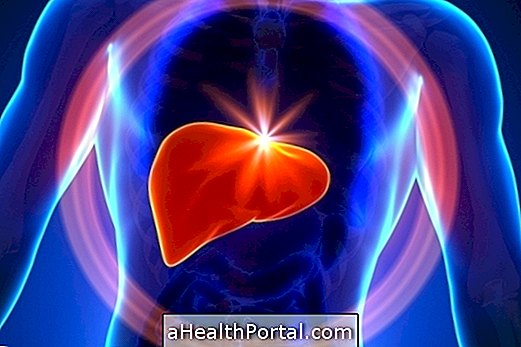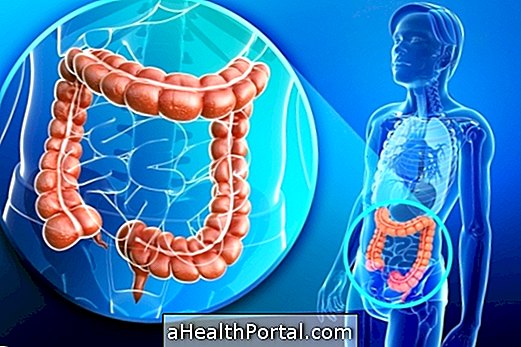Hepatitis is an inflammation in the liver caused, most often by viruses, but can also be a result of the use of medications or response of the body, being called autoimmune hepatitis. Learn all about hepatitis: how to identify, when to cure and how to transmit.
The different types of hepatitis are: A, B, C, D, E, F, G, autoimmune hepatitis, drug hepatitis and chronic hepatitis. Know more:

Hepatitis A
Main symptoms: Most often hepatitis A has mild symptoms, characterized by fatigue, weakness, decreased appetite and pain in the upper part of the belly, but there may be a history of fulminant hepatitis. People who have already had hepatitis A have immunity to this type of hepatitis, however, it remains susceptible to other types. See the symptoms of hepatitis A.
How it is transmitted: The transmission of the hepatitis A virus occurs through contact with contaminated food or water. Learn how to prevent hepatitis.
What to do: It is important to perform hygiene when eating and preparing food to avoid contact with the hepatitis A virus. It is also important to avoid sharing toothbrushes and cutlery and avoid unprotected intimate contact.
Hepatitis B
Main symptoms: Hepatitis B can be asymptomatic but still needs treatment to prevent disease progression and liver deterioration. In symptomatic cases, there may be nausea, low fever, joint pain and abdominal pain, for example. Find out what the first 4 symptoms of hepatitis B are.
How it is transmitted: Hepatitis B is transmitted through contact with blood or contaminated secretions, such as blood transfusions, needle and syringe sharing, and unprotected sexual intercourse, primarily, making hepatitis B a sexually transmitted disease (STD).
What to do: The best way to prevent hepatitis B is with the vaccination still in the maternity, so that the child creates immunity against this virus. If the adult has not received the vaccine during childhood, it is important to seek a health post to carry out the vaccine. Understand more about the hepatitis B vaccine.
It is also important not to have unprotected sex and to pay attention to the hygiene conditions of manicure, tattoo and piercing environments, as well as avoid sharing syringes and needles.
Hepatitis C
Main symptoms: In most cases, the symptoms of hepatitis C appear between 2 months and 2 years after contact with the virus, the main symptoms being yellow skin, dark urine, abdominal pain and loss of appetite. Learn about other symptoms of hepatitis C.
How it is transmitted: Hepatitis C is a liver infection caused by contact with blood or secretions contaminated with the virus and is cured when it is discovered early and treatment is started promptly. If left untreated, hepatitis C can progress to chronic hepatitis, which can lead to cirrhosis or liver failure.
What to do: As soon as the first symptoms of hepatitis C appear, it is advisable to go to the infectologist or hepatologist to have the diagnosis and treatment started. Usually the indicated treatment is done with antivirals, like Interferon, Daklinza or Sofosbuvir and lasts about 6 months.

Hepatitis D
Main symptoms: This type of hepatitis can be asymptomatic, symptomatic or symptomatic serious according to the degree of liver involvement by the virus. Know the symptoms of hepatitis.
How it is transmitted: Hepatitis D, also called Delta hepatitis, is an infection that can be transmitted through contact with skin and mucosa contaminated with the virus through unprotected sex or sharing of needles and syringes.
The hepatitis D virus depends on the hepatitis B virus to replicate and cause disease. If left untreated, it may result in fulminant hepatitis, which is a severe inflammation of the liver that can lead to death. Learn about the symptoms, causes and treatment of fulminant hepatitis.
What to do: The prevention of hepatitis D occurs through vaccination against hepatitis B, as the hepatitis D virus depends on the hepatitis B virus to replicate.
Hepatitis E
Main symptoms: Hepatitis E usually is asymptomatic, especially in children, but when symptoms appear, the main ones are low fever, abdominal pain and dark urine. Learn all about hepatitis E.
How it is transmitted: Hepatitis E is transmitted through ingestion of contaminated food or water or contact with feces and urine of people infected with the virus. This disease usually occurs in outbreaks due to poor hygiene or lack of basic sanitation.
What to do: There is no vaccine for hepatitis E and the treatment consists of rest, hydration, good nutrition and avoid using medications or drinking alcoholic beverages. Learn how to diet to treat hepatitis.
Hepatitis F
Hepatitis F is considered a subgroup of hepatitis C, but the virus that causes hepatitis has not yet been identified and, therefore, this type of hepatitis is still disregarded. Hepatitis F has been found in monkeys in the laboratory, but there are no reports of people infected with this virus.
Hepatitis G
How it is transmitted: Hepatitis G is caused by the hepatitis G virus that is often found in individuals diagnosed with hepatitis B, hepatitis C, or HIV. This virus can be transmitted through relationships without a condom, blood transfusion, or from mother to child through normal delivery.
What to do: The treatment for this type of hepatitis is not very well established, since it is not related to chronic cases of hepatitis and nor need for liver transplantation, however, it is important to consult the hepatologist or infectologist for better guidance.

Autoimmune hepatitis
Main Symptoms: Symptoms of autoimmune hepatitis happen due to deregulation of the immune system, resulting in such as abdominal pain, yellowing of the skin and nausea. Here's how to identify autoimmune hepatitis.
As it happens: Autoimmune hepatitis is a genetic disease in which the body produces antibodies against the liver's own cells leading to its progressive destruction. On average, patients diagnosed with autoimmune hepatitis who are not adequately treated have a 10-year survival.
What to do: As soon as the first symptoms appear, a hepatologist or gastroenterologist should be sought for optimal treatment to begin. Usually treatment is done with the use of corticosteroids, such as Prednisone, or immunosuppressants, such as azathioprine. In addition, it is important to maintain adequate nutrition. Learn how to diet for autoimmune hepatitis.
Hepatitis Medicamentosa
Main symptoms: The symptoms of drug hepatitis are the same as that of viral hepatitis, ie, vomiting, nausea, abdominal pain, dark urine and light stools, for example. Learn more about drug hepatitis.
How it happens: Drug hepatitis can be caused by over-or under-taking of medications, by the person's hypersensitivity to the drug or by the drug's toxicity. In this case, the liver can not metabolize toxins from the drugs and ignites generating the typical symptoms of hepatitis. See which medicines can cause hepatitis.
What to do: The treatment is to stop taking the medicines or switch to others less aggressive to the liver, always with medical guidance.
Chronic Hepatitis
Main symptoms: This type of hepatitis is characterized by fatigue, aching joints, fever, malaise, decreased appetite and memory loss.
As it happens: Chronic hepatitis is inflammation of the liver that lasts for more than 6 months and that can lead to cirrhosis or liver failure and, depending on the severity of the lesions, a liver transplant may be necessary. See more about chronic hepatitis.
What to do: The treatment of chronic hepatitis depends on the severity of the lesions and can be done either with the use of medications such as steroids indefinitely or with liver transplantation.
How is hepatitis diagnosed?
The diagnosis of hepatitis is made by the general practitioner or hepatologist by assessing the symptoms described by the person, in addition to the results of imaging and laboratory tests that may be requested.
Imaging tests such as ultrasonography of the abdomen and computed tomography, for example, aim to assess the structure and integrity of the liver. Laboratory tests are the most commonly used to confirm hepatitis, because when there is an injury or inflammation in the liver due to the presence of viruses, autoimmune diseases or chronic use of drugs or alcohol, for example, there is a higher production of liver enzymes, or the concentration of these enzymes increases in the bloodstream, and their concentration may be used to indicate hepatitis and the disease stage.
In addition to assessing the concentration of hepatic enzymes, to differentiate the type of hepatitis, the physician may request serological tests to identify the presence of antigens or antibodies against a particular hepatitis virus, and may indicate the type of hepatitis. hepatitis. Find out which tests evaluate the liver.
























